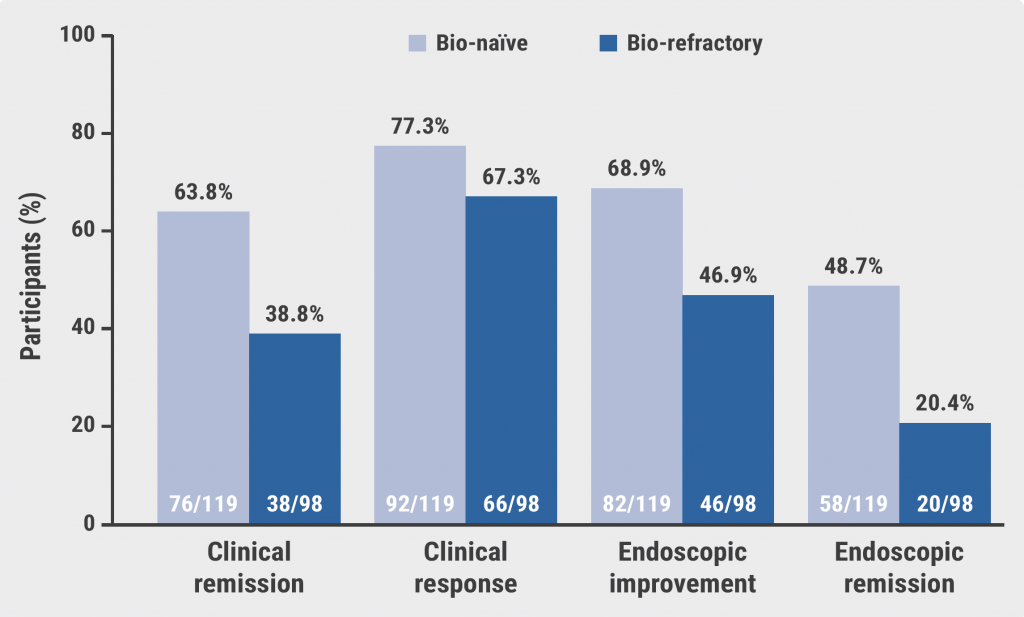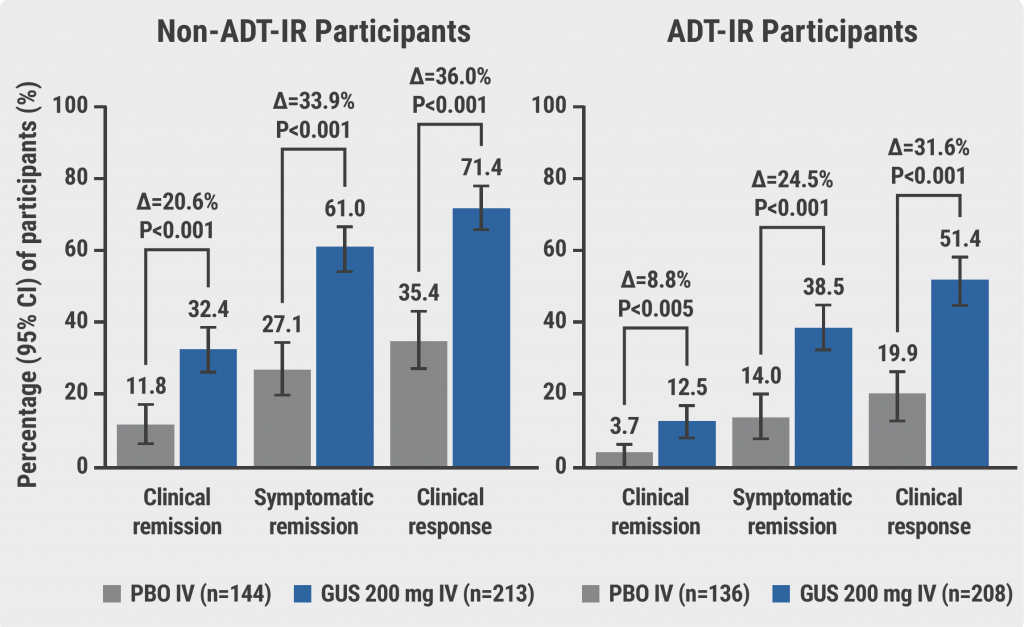https://doi.org/10.55788/14a9c7fb
The phase 3, double-blind, placebo-controlled STARS trial (NCT04627025) included 164 adults with SBS-IF, who were randomised in a 2:1 ratio to receive either once-weekly subcutaneous apraglutide or a placebo. Participants were stratified by intestinal anatomy (stoma or colon-in-continuity [CIC]) and received either 2.5 mg or 5 mg of apraglutide based on their weight. The primary endpoint was the relative change in weekly parenteral support volume at week 24. Secondary endpoints included additional days off parenteral support at weeks 24 and 48, and the total enteral autonomy at week 48. Prof. Francisca Joly (Hopital Beaujon, France) presented the findings [1].
The primary endpoint was met, with apraglutide-treated participants showing a significantly larger reduction in weekly parenteral support volume at week 24 compared with placebo (-25.5% vs -12.5%; P=0.001). This effect was evident as early as week 8 (see Figure). In the stoma subgroup, the reduction was more pronounced (-25.6% vs -7.8%; P<0.001). Although the CIC subgroup showed a numerical benefit, it did not reach statistical significance (-25.2% vs -17.6%; P=0.179). A significant proportion of participants on apraglutide achieved an additional day off parenteral support per week at week 24 (43% vs 27.5%; P=0.04).
Figure: Relative weekly reduction of parenteral support volume from baseline [1]

Moreover, apraglutide led to total enteral autonomy in a significant percentage of participants by week 24 (6.4% vs 0% in the placebo group; P=0.006), with sustained benefits observed at week 48 (12.5% vs 7.4% in the placebo group; P=0.387). Apraglutide was well tolerated, with a low discontinuation rate due to adverse events (3.6% vs 1.9%).
“Apraglutide is the first once-weekly GLP-2 analogue to show significant efficacy in reducing parenteral support volume in a phase 3 trial for participants with SBS-IF. The trial confirmed that apraglutide significantly reduces weekly parenteral support volume and increases days off parenteral support with a favourable safety profile,” Prof. Joly summarised.
- Joly F, et al. Efficacy and safety of apraglutide once-weekly in patients with short bowel syndrome and intestinal failure (SBS-IF): results from the STARS study - a global phase 3 double-blind, randomized, placebo-controlled trial. 1057c, DDW 2024, 18–21 May, Washington, DC, USA.
Copyright ©2024 Medicom Medical Publishers
Posted on
Previous Article
« COX-2 inhibitors show promise in reducing severity of acute pancreatitis Next Article
Acalculous cholecystitis as a risk factor for gallbladder perforation: insights from a 10-year retrospective study »
« COX-2 inhibitors show promise in reducing severity of acute pancreatitis Next Article
Acalculous cholecystitis as a risk factor for gallbladder perforation: insights from a 10-year retrospective study »
Table of Contents: DDW 2024
Featured articles
PREEMPT CRC: Blood-based screening test for colorectal cancer shows promise
Eosinophilic Oesophagitis Treatments and Outcomes
Mepolizumab improves the histologic severity of eosinophilic oesophagitis
Budesonide demonstrates efficacy in eosinophilic oesophagitis
Dupilumab shows promising results in treating paediatric eosinophilic oesophagitis
Quality-of-life assessment in children with eosinophilic oesophagitis
Gut-Brain Axis and Neurological Disorders
Gut permeability and neuroinflammation linked in Parkinson’s disease
Cardiovascular and Metabolic Health Innovations
Promising data for cardiovascular outcomes of bariatric surgery in patients with obesity
Inflammatory Bowel Disease Therapies
GALAXI 2 & 3: Guselkumab proves efficacy in Crohn’s disease
QUASAR maintenance study: Guselkumab effective and safe for UC
VEDOKIDS: Vedolizumab maintains remission in patients with paediatric IBD
ADMIRE-CD II: Darvadstrocel does not meet primary endpoint in complex Crohn’s perianal fistulas
Advances in Endoscopy and Screening Techniques
PREEMPT CRC: Blood-based screening test for colorectal cancer shows promise
New cable-transmission capsule endoscopy shows high accuracy in detecting upper GI lesions
Liver and Biliary Tract Diseases Updates
Superior OS with atezolizumab plus bevacizumab versus lenvatinib in unresectable HCC
Nutritional consultation boosts nutritional status in patients with alcohol-associated hepatitis
REGENERATE study: Obeticholic acid shows antifibrotic benefit in NASH
Acalculous cholecystitis as a risk factor for gallbladder perforation: insights from a 10-year retrospective study
Other Gastrointestinal Diseases
STARS: Apraglutide shows efficacy in short bowel syndrome with intestinal failure
COX-2 inhibitors show promise in reducing severity of acute pancreatitis
Hormone-containing therapies may increase the risk of IBS and functional dyspepsia
Related Articles
June 13, 2023
IBS management: the complex role of dietary fibres

December 7, 2023
Obefazimod takes the spotlight as promising UC treatment

© 2024 Medicom Medical Publishers. All rights reserved. Terms and Conditions | Privacy Policy
HEAD OFFICE
Laarderhoogtweg 25
1101 EB Amsterdam
The Netherlands
T: +31 85 4012 560
E: publishers@medicom-publishers.com

